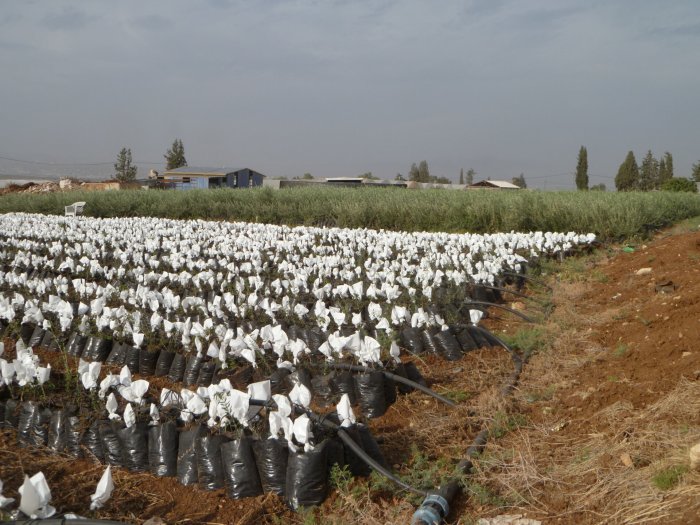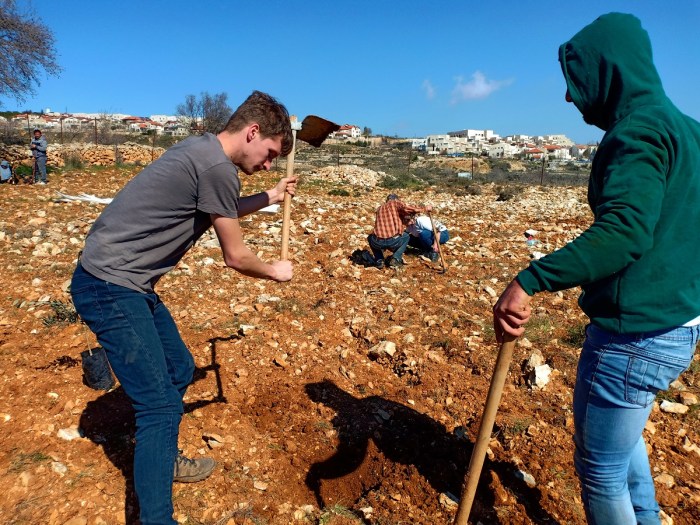Socioeconomic Impact of Olive Cultivation

Plant an olive tree palestine – Olive cultivation in Palestine holds profound socioeconomic significance, extending far beyond mere agricultural production. It represents a vital source of income for countless Palestinian families, contributes significantly to the national economy, and plays a crucial role in preserving cultural heritage. The interwoven nature of olive farming with Palestinian identity and livelihood makes it a particularly sensitive and important sector to understand.The economic contribution of olive oil production to Palestinian households and communities is substantial.
For many families, particularly in rural areas, olive groves represent their primary source of income and sustenance. The harvesting, processing, and sale of olives and olive oil provide employment opportunities throughout the year, from seasonal labor during the harvest to year-round work in olive oil presses and related businesses. The income generated supports not only individual families but also contributes to the overall economic vitality of local communities.
Economic Contribution of Olive Oil Production
Olive oil production provides a significant source of income for Palestinian households, often representing their primary means of livelihood, particularly in rural communities. The sale of olives and olive oil directly contributes to household income, while related activities like processing and transportation create additional employment opportunities. This income is crucial for meeting basic needs such as food, housing, education, and healthcare.
Furthermore, the economic activity generated by olive cultivation stimulates local economies, supporting related businesses and creating a ripple effect throughout the region. The value of the olive oil industry in Palestine is considerable and represents a vital part of the country’s agricultural sector.
Cooperative Farming Initiatives
Cooperative farming initiatives play a vital role in enhancing the efficiency and profitability of olive cultivation in Palestine. These cooperatives often pool resources, share equipment, and collectively market their products, achieving economies of scale and improving access to markets. This collaborative approach strengthens the bargaining power of individual farmers, enabling them to secure better prices for their produce and negotiate more favorable terms with buyers.
Examples include various cooperatives across the West Bank and Gaza Strip that specialize in olive oil production, often combining traditional methods with modern technologies to enhance quality and yield. These cooperatives also provide training and support to their members, promoting sustainable farming practices and ensuring the long-term viability of olive cultivation.
Impact of Political and Economic Factors
The olive oil industry in Palestine is significantly impacted by political and economic factors. Restrictions on movement, access to land, and market access due to the ongoing Israeli-Palestinian conflict significantly hinder the development of the sector. Land confiscations, destruction of olive groves, and the construction of the separation barrier have all had a devastating impact on olive farmers.
Furthermore, economic policies and trade restrictions can limit the ability of Palestinian farmers to compete in international markets. These challenges underscore the need for supportive policies and international cooperation to help the Palestinian olive oil industry thrive despite these considerable obstacles. The resilience of Palestinian olive farmers in the face of these adversities is a testament to their determination to maintain their livelihoods and cultural heritage.
Planting an olive tree in Palestine, a symbol of resilience and heritage, requires careful consideration of soil and climate. The process shares some similarities with planting other trees; for instance, understanding the optimal conditions mirrors the detailed instructions found in this guide on how to plant a catalpa tree , although the specific needs of each species differ significantly.
Ultimately, successful olive cultivation in Palestine depends on meticulous attention to detail, mirroring the dedication required for any successful tree planting endeavor.
Uses of Olives and Olive Oil in Palestinian Culture
Olives and olive oil are integral to Palestinian cuisine and daily life, reflecting a rich culinary tradition passed down through generations.
- Olive oil is the primary cooking fat, used in a wide variety of dishes, from stews and salads to pastries and breads.
- Olives, both green and black, are enjoyed as a staple food, eaten fresh, pickled, or used in various dishes.
- Olive oil is used in traditional Palestinian beauty treatments, for its moisturizing and skin-soothing properties.
- Olive oil lamps are still used in some areas, representing a connection to historical traditions.
- Olive wood is used to create beautiful and functional items, including utensils, furniture, and religious artifacts.
Olive Tree Planting: Plant An Olive Tree Palestine

Planting an olive tree in Palestine is far more than an agricultural act; it’s a deeply symbolic gesture woven into the fabric of Palestinian identity and resilience. It represents a profound connection to the land, a testament to enduring hope in the face of adversity, and a powerful act of resistance against displacement and dispossession. The olive tree, deeply rooted in Palestinian history and culture, stands as a symbol of peace, prosperity, and steadfastness.
The Symbolic Significance of Olive Tree Planting
The olive tree holds immense cultural and religious significance for Palestinians. Its longevity mirrors the enduring spirit of the Palestinian people, while its fruit provides sustenance and economic stability. Planting an olive tree is an act of defiance against attempts to erase Palestinian presence from their ancestral lands. It is a tangible expression of hope for a future where they can cultivate their land freely and peacefully.
The act symbolizes the deep-rooted connection between the Palestinian people and their land, a connection that transcends generations and political turmoil. This connection is not merely physical; it’s spiritual and deeply ingrained in their cultural identity.
The Process of Planting an Olive Tree
Selecting healthy saplings is crucial for successful planting. These saplings, often obtained from local nurseries or from existing olive groves, should be free from disease and exhibit vigorous growth. The chosen location should have well-drained soil and sufficient sunlight. Before planting, the soil is prepared by tilling and removing any weeds or rocks. A hole is dug, large enough to accommodate the sapling’s root system without cramping.
The sapling is carefully placed in the hole, ensuring its roots are spread out naturally. The hole is then filled with soil, gently firming it around the base of the sapling. Regular watering is essential, particularly during the initial stages of growth, ensuring the sapling receives adequate moisture. Pruning is also important to maintain the tree’s shape and promote healthy growth.
Ongoing care includes fertilization to provide essential nutrients and protection from pests and diseases.
Establishing an Olive Grove
Establishing an olive grove requires careful planning and execution. Land preparation is critical, involving soil testing to determine its suitability and nutrient levels. This may involve amending the soil with organic matter to improve drainage and fertility. The spacing between trees must be considered to allow for adequate growth and sunlight penetration. Efficient irrigation systems are vital, especially in drier regions.
Drip irrigation is often preferred as it minimizes water waste and delivers water directly to the roots. Careful consideration must also be given to pest and disease management strategies, implementing preventative measures and appropriate treatments as needed. The grove’s layout should also consider ease of access for harvesting and maintenance.
A Thriving Olive Grove in Palestine, Plant an olive tree palestine
Imagine a hillside gently sloping towards the Mediterranean Sea. Rows of ancient olive trees, their gnarled trunks bearing witness to centuries of history, stretch as far as the eye can see. Their silvery-green leaves shimmer in the sunlight, casting dappled shadows on the ground. The air is filled with the scent of ripe olives, a fragrance both earthy and sweet.
The landscape is a patchwork of green olive groves, punctuated by the occasional stone farmhouse, their whitewashed walls gleaming against the backdrop of rolling hills. Birdsong fills the air, and the gentle rustling of leaves creates a soothing symphony. The scene is one of serenity and resilience, a testament to the enduring spirit of the Palestinian people and their deep connection to their land.
The grove is not just a collection of trees; it is a living testament to their history, culture, and unwavering hope for the future. Each tree represents a story, a legacy passed down through generations, a symbol of enduring strength and peaceful coexistence.
Detailed FAQs
What are the main varieties of olive trees grown in Palestine?
Palestine boasts a diverse range of olive cultivars, each with unique characteristics in terms of fruit size, oil yield, and flavor profile. Some common varieties include Nabali, Baladi, and Soury.
What are the traditional uses of olive leaves in Palestinian culture?
Beyond the fruit and oil, olive leaves hold cultural significance. They are sometimes used in traditional medicine for their purported health benefits, and also feature in certain culinary preparations.
How does the Palestinian olive oil industry compete in the global market?
Palestinian olive oil faces challenges competing internationally due to political and economic factors, but its high quality and unique characteristics provide a strong niche market appeal.
Are there any international organizations actively supporting Palestinian olive farmers?
Yes, several international NGOs and organizations work to support Palestinian olive farmers, providing assistance with training, resources, and advocacy for their rights.
